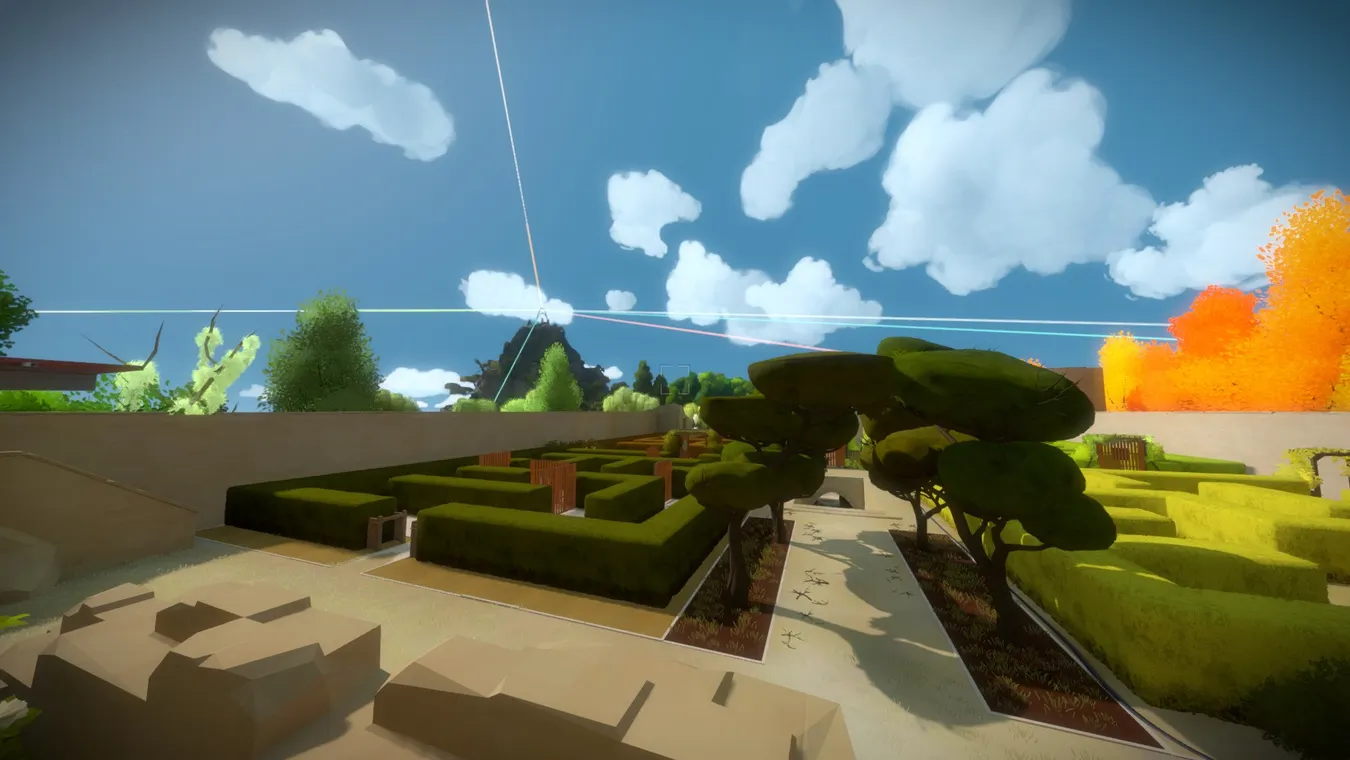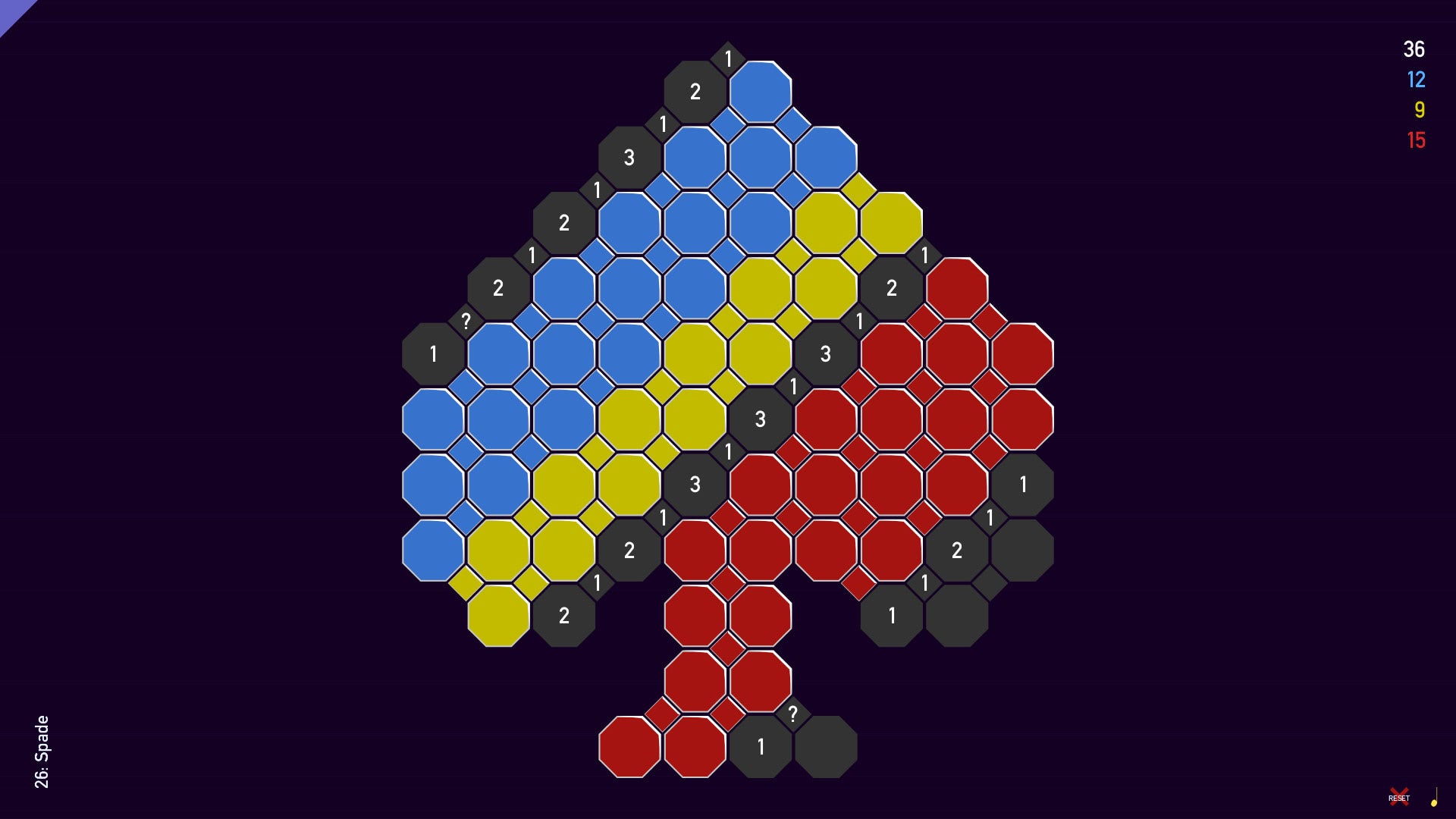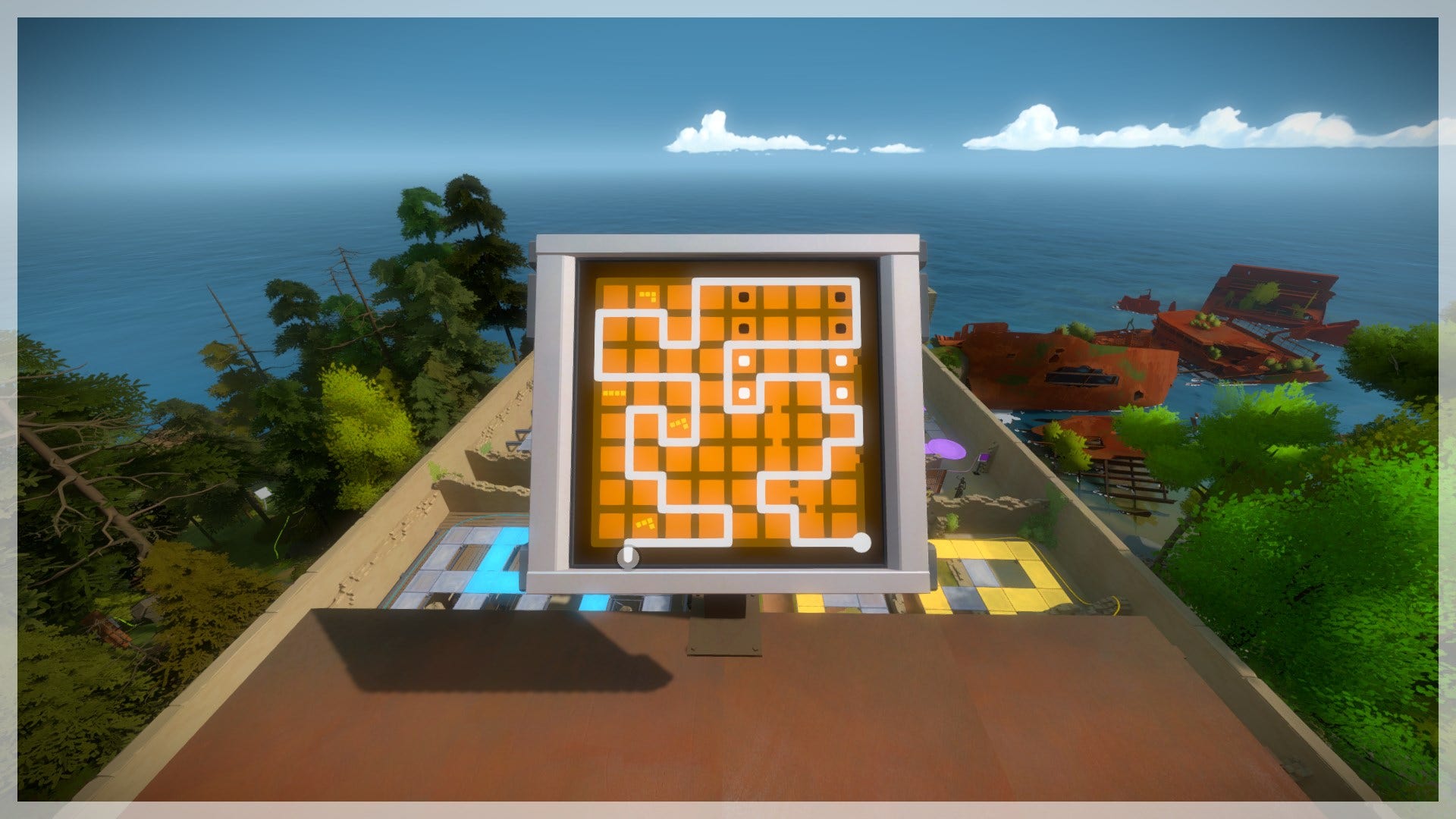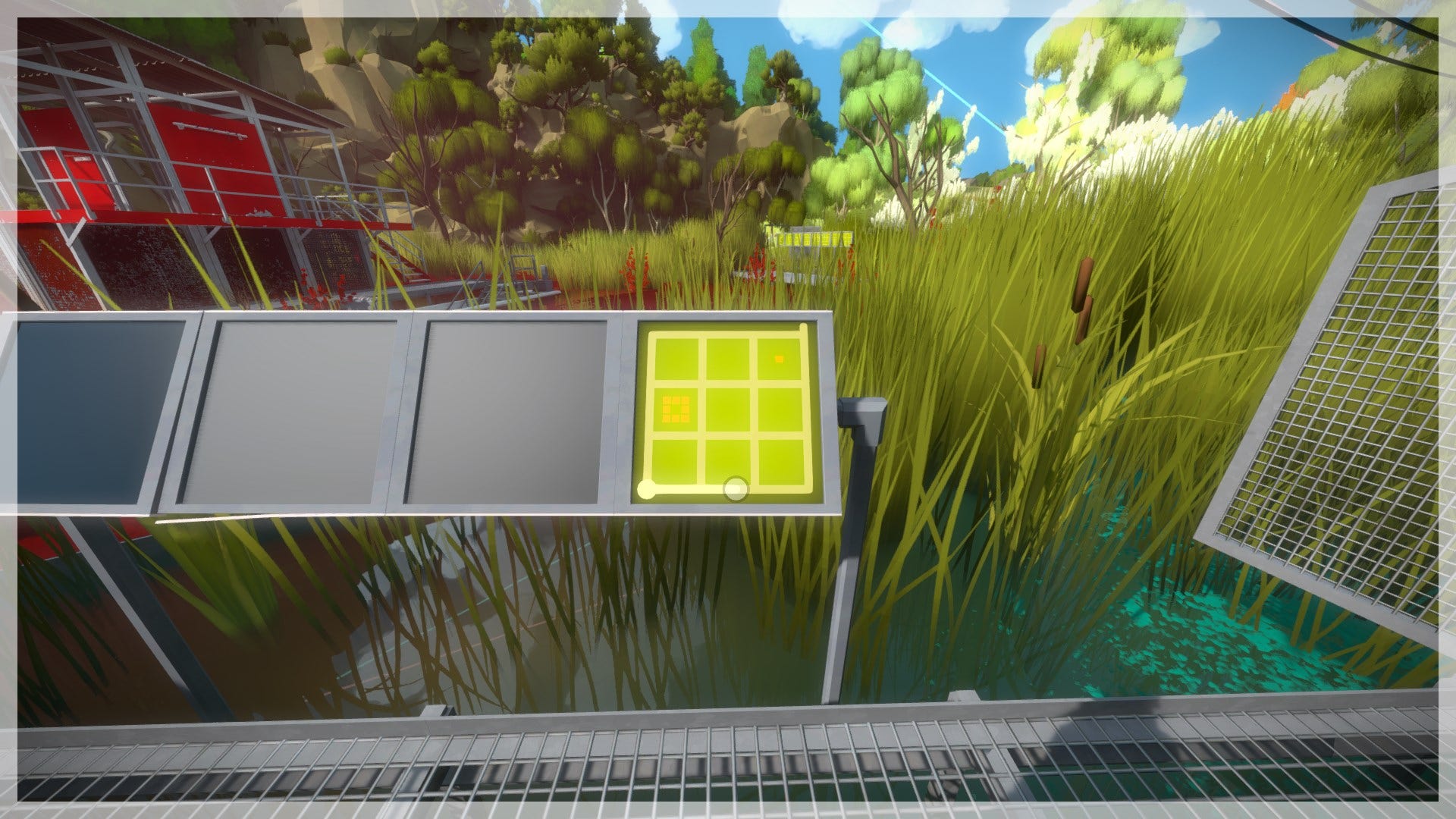Thoughts On The Puzzle Game Design Of The Witness And How It Levels The Playing Field For Everyone
26 2月 2024

it truly is a game full of genius and non-genius content.
i play a lot of puzzle games and i often give up near the end because i got bored of it. for example, i dropped Baba is You at the endgame puzzle because i realized the necessary steps for executing the final solution were too much for little gain. puzzle games can be too hard or too easy and they become pretty uninteresting to me as a result.
The Witness is one of the few games where i actually completed, so it joins the ranks of Void Stranger, the Hexcells series, and Voxelgram for me. it satisfies my love for certain logic puzzles with clear rules and creative solutions.
it's also full of stupid shit.
disclaimer
for this post, i'm just going to talk about the puzzle game design. no lore discussions, no secret ending stuff, only the boring puzzle game stuff from a player who enjoyed and hated every second of The Witness.
if you are looking for some epic essay on The Witness being good or bad, go watch YouTube. i'm just interested in discussing what i find interesting in The Witness's puzzle game design and what i take away from it.
no puzzle game knowledge needed
the most novel/refreshing thing The Witness is changing how solving puzzles work. the best way to explain this is through another logic puzzle game. i'll be using one of my favorite puzzle games, Tametsi, for example:

Tametsi is a logic minesweeper game and the rules are therefore clearly laid out: numbers indicate bombs near the tile, so tread carefully. there's no mystery in the rules or the way the puzzle is designed; the "genius" is seeing how someone could design a beautiful minesweeper puzzle in surprising shapes and guide you to making educated guesses. this is the kind of puzzle i usually play and enjoy the most.
but it doesn't lead to any unique discoveries for the player. even the famous "Miracle Sudoku" video by Cracking the Cryptic is more about going "how the hell is this constrained ruleset supposed to help me fill in the blanks?" for the puzzles of Tametsi and miracle sudokus to work, the rules have to be carefully parsed and followed by the player. in some ways, we are like programs trying to compute the algorithm the devs have written for us; however, the code is just a bit obscured and our joy comes from executing it and going omg that's crazy.
The Witness has this too, but its puzzles are introduced differently because it has its own grammar. unlike many puzzle games that have rules established by tradition (anyone can play any sokoban game once they know the rules), The Witness has its own shibboleth, that is its own language and custom unique from everything else.
and most of the game's difficulty is figuring out wtf is The Witness saying:

don't worry about spoilers by the way because this solution is wrong. this is one of my screencaps drafting a solution and likely you won't understand wtf i'm trying to do anyway. but i paste this screencap to show that, unless you are familiar with the language The Witness is doing, you won't understand what i am trying to do and what my mistake is. to put it another way, you don't need to be a genius at sokoban or sudoku to play The Witness; you just need to be good at The Witness to play The Witness.[^2]
and that means the game is leveling the playing field for everyone. they all have to start from scratch and figure out wtf the rules are.
rule-finding structures the entire game
just like learning a language, you gotta find the game's grammatical rules. these are sprinkled around the world and you have to go out your way and explore this somewhat open world. this is where i think the game becomes magical.
early on in my run, i discovered some screens with rules i've never seen before. i tried to figure them out, but it was a waste of time. however, as i explored other spaces and then learned how the rules worked, i could apply them into the older screens i passed. solving these puzzles and unlocking shortcuts or secrets was unbelievably rewarding; i never felt this kind of metroidvania-esque progression in a puzzle game before where, instead of getting tools, i am gaining a more comprehensive knowledge of the game's ruleset and can take on even harder puzzles.
and it's not like the puzzles are easy. many puzzles often play with your superficial and elementary understanding of the rules; in fact, it will block you in order to make you arrive at the proper definition. i like to think of it as learning a new word and getting more and more equipped to use it. i've discovered symbols where i assumed it followed xyz rule, but it turns out that it had a more precise and nuanced definition. it was fascinating to see how my understanding of the rules kept changing but still manageable; it's just more refined than ever and the earlier puzzles that stumped me made more sense with this new understanding.
it's also great that you're learning rules to learn other rules. it's even more rewarding when you find and solve puzzles that mix these rules together. i don't think these puzzles are complex or hard; however, navigating the interplay between these rules is so satisfying that i want to see more complex variations.
this is a really interesting way to do puzzle game progression that can only be done with original mechanics. pattern recognition becomes easier and faster once you are able to iterate and reiterate on the rules many, many times.[^1] it's kinda like learning your multiplication tables in schools: you notice that the 9 table is quite easy because both digits will always add to 9 (54, 81, 36). indeed, a certain timed "challenge" in The Witness post-game requires quick recognition of puzzle patterns and it's only reasonable because people have been immersed in these rules for so long that they start seeing it in puzzles and elsewhere.
i find The Witness novel because i'm playing a new kind of puzzle game. i can't depend on previous puzzle game knowledge that much like i would with sokoban games. it's nice that i have to relearn how to play puzzle games all over again.
environmental puzzles?
this is also present in the environmental puzzles, which i'm a bit mixed on. both the mandatory and the extra challenge puzzles are different from the types of puzzles i'm used to, but i don't find them satisfying.
i'm more of a Puzzle Purist where i dislike add-ons and ornamental details that figure into the puzzle. i just want the board and the puzzle, plain and simple. so i wasn't fond of the puzzles where you have to go around the map and look at the puzzle in a different way. i just find it annoying at best.
but at the same time, i recognize there's some very clever puzzle building. these puzzles test how observant you are with the environment and enjoy breaking the constraints of what puzzles are usually like. i admire them, but i don't particularly enjoy them.
still, i think this is another aspect that makes the game equally enjoyable to everyone. it's beyond the restrictions of logic puzzle games and it makes the players engage in the genuinely beautiful environment, so it definitely earns its reputation.
audio, colorblind, and hard to see puzzles lol
what i don't have patience with are the puzzles that everyone already hates: the audio and colorblind puzzles.
the audio puzzles may be one of the worst audio puzzles i've seen in a game since it tests your understanding on pitch; it can be the easiest or hardest puzzle game. deaf people basically need to use a walkthrough for this.
there are also puzzles that are just hard to see, even if you have good eyesight and aren't colorblind:

the swamp puzzles have lime green on green, resulting in very low contrast puzzles. these puzzles are the most egregious, but there are countless examples of puzzles that have extremely poor contrast.
and starting from the midgame, i also had difficulty recognizing symbols from each other because the panel was too small. one shape could blur into another. i had to lean closer to the monitor to see what the hell the shape is.
for those who got to the endgame, they'll also be treated to some mandatory puzzles with flashing lights, resulting in a strobe-lite effect. a friend, upon hearing this, said that blow has invented a puzzle worse than audio puzzles and i cannot disagree with that.
and other endgame puzzles made me kinda motion-sick (in a game already notorious in making people who play fps games motion-sick. i won't explain why because spoilers, but i got headaches from staring at the panel.
these puzzles are not only poor for accessibility reasons, but the gimmicky ones don't really test your understanding of the rules that much. they are more or less isolated gimmicks that don't build your understanding of the more universal definitions/rules of the game; the game will bring them back from time to time, but they're not otherwise necessary to learn the other rules in the game. they're just gimmicks that stop some players from playing and nothing more than that.
and i think it's a shame that many people dropped the game because of some audio puzzle shenanigans. it's another instance of proof that what makes people drop puzzle games isn't lack of their intelligence/perseverance but bad puzzles.[^3]
conclusion: i have to talk about the looker
i like The Witness as a puzzle game. it reintroduced me the joy of discovering puzzle games again and i can see why this title has influenced how developers make puzzle games. i've always wondered why puzzle games have hubs or allow you to go to different puzzles through a map of sorts -- well, The Witness is to blame for that.
and if you play something like Can of Wormholes, you can see how people are trying to reignite the spirit of discovering new rules and methods through their own solutions. instead of dropping players into the map with no explanation (lol, Stephen's Sausage Roll), there are now games interested in handholding the player and making them excited about the new rules they're going to discover.
of course, nothing feels like it's able to capture the originality of The Witness. there's something riveting about stumbling upon these rules and learning to play with them. before writing this post, i played a bit of Taiji which is quite the 2d demake of The Witness. it's gorgeous, but i was already too familiar with the gameplay loop and didn't want to partake in the grind.
instead, the game that seems to understand The Witness the most is the offbeat parody, The Looker:
https://store.steampowered.com/app/1985690/The_Looker/
The Looker is a free "puzzle" game that parodies the story beats of The Witness, including its memorable beginning and questionable secret ending. however, the puzzles are all taking jabs on how The Witness as a game works.
these puzzles repackage the lessons and missteps from The Witness into surprising minigames. there are some intentionally silly puzzles, but there are a few puzzles that show a deep respect for the original game (the book puzzle in the altar follows the same knowledge acquisition progression) and there's even some nice innovations (the epic Snek arcade game). even the final puzzle is both a dig on what makes The Witness a work of genius and ridicule: you are drawing something magnificent through the environment and it cleverly builds on rules jokingly introduced throughout the game.
The Looker is very short and it can be played by anyone, even with zero knowledge of The Witness. and i think that's actually the best lesson it got from The Witness: make puzzle games enjoyable/equally difficult for everyone. the final puzzles speedrun the obsession people have with puzzle games and how they see everyday objects as puzzles from the games they've been playing. it's an obsession i wish more people could enjoy it.
if a nice riposte like The Looker could be made, i think The Witness is a boon to puzzle game history and i'm glad to have played it. it showed me new avenues on how to make puzzle games more accessible to players.
[^1]: again, this can be found in other puzzle games. but the point is games like The Witness levels the playing field; people who know sudoku can do magic squares easily as opposed to people who don't.
[^2]: if you've not played the game, you can watch the any% speedrun of The Witness and somehow not get too spoiled.
[^3]: i'm looking at you, Baba is You!!!!!!!!!!!!!!!!! for people interested in getting back to sokoban games or want to be introduced to a better puzzle game, i quite like Dungeons and Puzzles